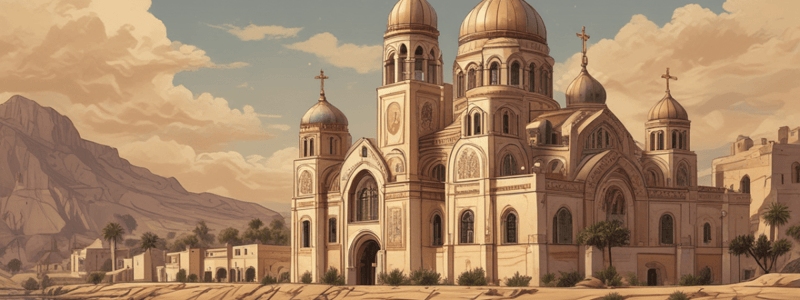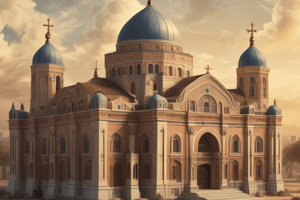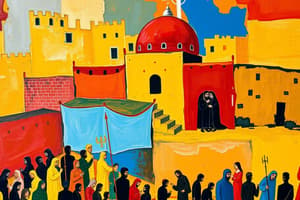Podcast
Questions and Answers
Where was Pope Dioscorus born?
Where was Pope Dioscorus born?
- Gangra
- Rome
- Alexandria (correct)
- Edko
What happened to Pope Dioscorus after he expressed the true orthodox faith to the emperor and empress?
What happened to Pope Dioscorus after he expressed the true orthodox faith to the emperor and empress?
- He was exiled to the Island of Gangra
- He was given a high-ranking position in the Church
- He was hailed as a hero and returned to Alexandria
- He was punished and his hair was pulled (correct)
What was the result of the Council of Chalcedon?
What was the result of the Council of Chalcedon?
- The Church was abolished
- The Church was united under one doctrine
- The Church was led by Pope Dioscorus
- The Church was split into Chalcedonian and Non-Chalcedonian Churches (correct)
What is the name of the Church that Pope Dioscorus was a part of?
What is the name of the Church that Pope Dioscorus was a part of?
What is the term used to describe the Churches that do not accept the Council of Chalcedon?
What is the term used to describe the Churches that do not accept the Council of Chalcedon?
Flashcards are hidden until you start studying
Study Notes
Coptic Orthodox Church
- The Coptic Orthodox Church is an Egyptian Church, and "Orthodox" means straight in faith.
- The Church was preached by St. Mark the Apostle and has remained faithful to the teachings, rites, and Holy Tradition.
Early Centuries of the Church
- Many heresies arose due to incorrect interpretations of Bible verses, leading to the need for ecumenical councils.
- The ecumenical councils were gatherings of bishops from all the original Apostolic Churches to discuss and refute heresies and confirm the true Orthodox faith.
Coptic Orthodox Church's Recognized Ecumenical Councils
- The Council of Nicaea (325 AD)
- The Council of Constantinople (381 AD)
- The Council of Ephesus (431 AD)
The Second Council of Ephesus (449 AD)
- The council was called by Emperor Theodosius II to look into the teachings of Eutychus, an archimandrite in Constantinople.
- Eutychus fell into heresy while trying to refute the Nestorian heresy, teaching that the humanity of Christ was consumed by His divine nature.
- Pope Dioscorus of Alexandria presided over the council, and Eutychus was restored to the Church after confessing the true Orthodox faith.
- However, Eutychus returned to his false teachings and was anathematized.
The Council of Chalcedon (451 AD)
- The council was called by Emperor Marcian based on a request from the Bishop of Rome.
- Pope Dioscorus attended and defended the true Orthodox faith, but the council ultimately cancelled the decisions of the second council of Ephesus.
- The council gave absolution to Flavian of Constantinople and excommunicated Eutychus and Pope Dioscorus.
- The Coptic Orthodox Church does not acknowledge the council of Chalcedon nor its decisions.
Pope Dioscorus
- Pope Dioscorus was born in Alexandria and served as Pope for 10 years, 1 month, and 9 days.
- He fought against heresies and divisions of the church, and his departure led to a 1-year vacancy in the See of St. Mark.
- Pope Dioscorus was exiled to the island of Gangra, where he eventually departed on the 7th of Thoout.
The Schism of the Church
- The council of Chalcedon led to the splitting of the whole church into Chalcedonian and Non-Chalcedonian Churches.
- The Non-Chalcedonian Churches, also known as the Oriental Orthodox Churches, are:
- The Church of Alexandria (The Coptic Church)
- The Armenian Church
- The Ethiopian Church
- The Eritrean Church
- The Syriac Church
- The Indian Orthodox Church (also known as Malankara Orthodox Church)
- The Chalcedonian Churches are the Catholic and the Eastern Orthodox Churches.
Studying That Suits You
Use AI to generate personalized quizzes and flashcards to suit your learning preferences.




